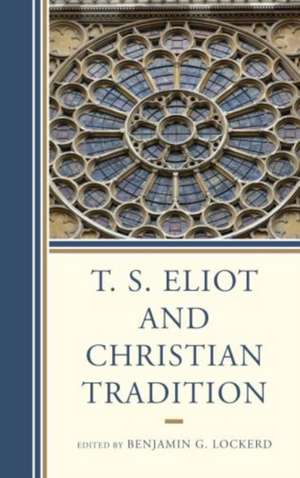T. S. Eliot and Christian Tradition
en Limba Engleză Paperback – 3 mar 2016
| Toate formatele și edițiile | Preț | Express |
|---|---|---|
| Paperback (1) | 535.48 lei 6-8 săpt. | |
| Rowman & Littlefield – 3 mar 2016 | 535.48 lei 6-8 săpt. | |
| Hardback (1) | 739.47 lei 6-8 săpt. | |
| Rowman & Littlefield – 18 iun 2014 | 739.47 lei 6-8 săpt. |
Preț: 535.48 lei
Nou
Puncte Express: 803
Preț estimativ în valută:
102.47€ • 105.71$ • 85.51£
102.47€ • 105.71$ • 85.51£
Carte tipărită la comandă
Livrare economică 26 martie-09 aprilie
Preluare comenzi: 021 569.72.76
Specificații
ISBN-13: 9781611477139
ISBN-10: 1611477131
Pagini: 358
Dimensiuni: 152 x 226 x 23 mm
Greutate: 0.5 kg
Editura: Rowman & Littlefield
ISBN-10: 1611477131
Pagini: 358
Dimensiuni: 152 x 226 x 23 mm
Greutate: 0.5 kg
Editura: Rowman & Littlefield
Notă biografică
Edited by Benjamin G. Lockerd - Contributions by Anderson D. Araujo; Hazel Atkins; William Blissett; William C....
Cuprins
Introduction
I. Eliot and Anglo-Catholicism
William Blissett, ¿T. S. Eliot and Catholicity¿
William Blissett, Catholicity: A Précis
II. French Catholic Influences
John Morgenstern, ¿T. S. Eliot and the French Catholic Revival: 1910-11 Paris¿
William Marx, ¿Eliot and Maurras on Classicism¿
Shun¿ichi Takayanagi, S.J., "T. S. Eliot, the Action Française and Neo-Scholasticism"
James Matthew Wilson, ¿An `Organ for a Frenchified Doctrine¿: Jacques Maritain, and The
Criterion¿s Neo-Thomism¿
III. Christian Tradition
William Charron, ¿Medieval Aristotelian Theories of the Soul in `Tradition and the Individual
Talent¿¿
Lee Oser, ¿T. S. Eliot and John Henry Newman¿
Dominic Manganiello, "T. S. Eliot, Charles Williams, and Dante¿s Way of Love"
Hazel Atkins, ¿T. S. Eliot, W. R. Lethaby, and Sacred Architecture¿
IV. Culture and Religion
Christopher McVey, ¿Backgrounds to The Idea of a Christian Society: Charles Maurras,
Christopher Dawson, and Jacques Maritain¿
Anderson Araujo, ¿Between `Absolutism¿ and `Impossible Theocracy¿:
Hierarchy in Eliot¿s Anglo-Catholicism¿
Paul Robichaud, ¿Eliot¿s Christian Sociology and the Problem of Nationalism¿
Benjamin Lockerd, ¿Beyond Politics: Christopher Dawson and T. S. Eliot on Religion and
Culture¿
V. Contemporaries
James Seaton, ¿Poetry and Religion in George Santayana and T. S. Eliot¿
David Huisman, "'A Long Journey Afoot': The Pilgrimages toward Orthodoxy of T. S. Eliot
and Paul Elmer More"
Charles Huttar, ¿C. S. Lewis¿s Appreciation of T. S. Eliot¿
Thomas Dilworth, ¿Eliot for David Jones¿
Bibliography
About the Contributors
